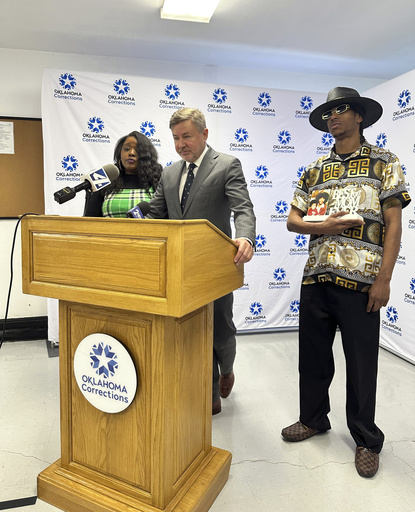McALESTER, Okla. (AP) — A man convicted of shooting and killing two people in Oklahoma City more than two decades ago was executed Thursday morning.
Michael Dewayne Smith received a lethal injection at the Oklahoma State Penitentiary in McAlester and was pronounced dead at 10:20 a.m., Oklahoma Department of Corrections spokesperson Lance West said.
After the first of three lethal drugs, midazolam, was administered, Smith, 41, appeared to shake briefly and attempt to lift his head from the gurney before relaxing. He then took several short, audible breaths that sounded like snores or gasps. Oklahoma DOC Director Steven Harpe said after the execution that Smith “appeared to have some form of sleep apnea.”
A masked doctor entered the execution chamber at 10:14 a.m. and shook Smith several times before declaring him unconscious.
Smith appeared to stop breathing about a minute later. The doctor reentered the execution chamber at 10:19 a.m. and checked for a pulse before Harpe announced the time of death.
Smith was sentenced to die in the separate shooting deaths of Janet Moore, 41, and Sharath Pulluru, 22, in February 2002. He is the first person executed in Oklahoma this year and the 12th put to death since the state resumed executions in 2021 following a nearly seven-year hiatus resulting from problems with executions in 2014 and 2015.
Given the opportunity to say last words, Smith responded, “Nah, I’m good.”
Moore’s son Phillip Zachary Jr. and niece Morgan Miller-Perkins witnessed the execution from behind one-way glass. Attorney General Gentner Drummond read a statement on their behalf that said in part: “Justice has been served.”
Drummond, in his own statement, called Moore “a rock for her family” and said Pulluru “was an inspiration to his family” as the first member to come to the United States for an education.
“Janet and Sharath were murdered simply because they were in the wrong place at the wrong time; that was all. I am grateful that justice has been served,” Drummond said.
During a clemency hearing last month, Smith expressed his “deepest sorrows” to the victims’ families, but denied he was responsible.
“I didn’t commit these crimes. I didn’t kill these people,” Smith said, occasionally breaking into tears during his 15-minute address to the board, which denied him clemency in a 4-1 vote. “I was high on drugs. I don’t even remember getting arrested.”
The U.S. Supreme Court on Thursday morning denied a stay of execution requested by Smith’s attorneys, who argued that his confession to police was not sufficiently corroborated.
Prosecutors say Smith was a ruthless gang member who killed both victims in misguided acts of revenge and confessed his involvement in the killings to police and two other people.
They claim he killed Moore because he was looking for her son, who he mistakenly thought had told police about his whereabouts. Later that day, prosecutors say Smith killed Pulluru, a convenience store clerk who Smith believed had disrespected his gang during an interview with a newspaper reporter.
Smith’s attorney, Mark Henricksen, argued that Smith is intellectually disabled, a condition worsened by years of heavy drug use, and that his life should be spared and he should be allowed to spend the rest of it in prison. Henricksen said Smith was in a PCP-induced haze when he confessed to police and that key elements of his confession aren’t supported by facts.
This website uses cookies so that we can provide you with the best user experience possible. Cookie information is stored in your browser and performs functions such as recognising you when you return to our website and helping our team to understand which sections of the website you find most interesting and useful.
